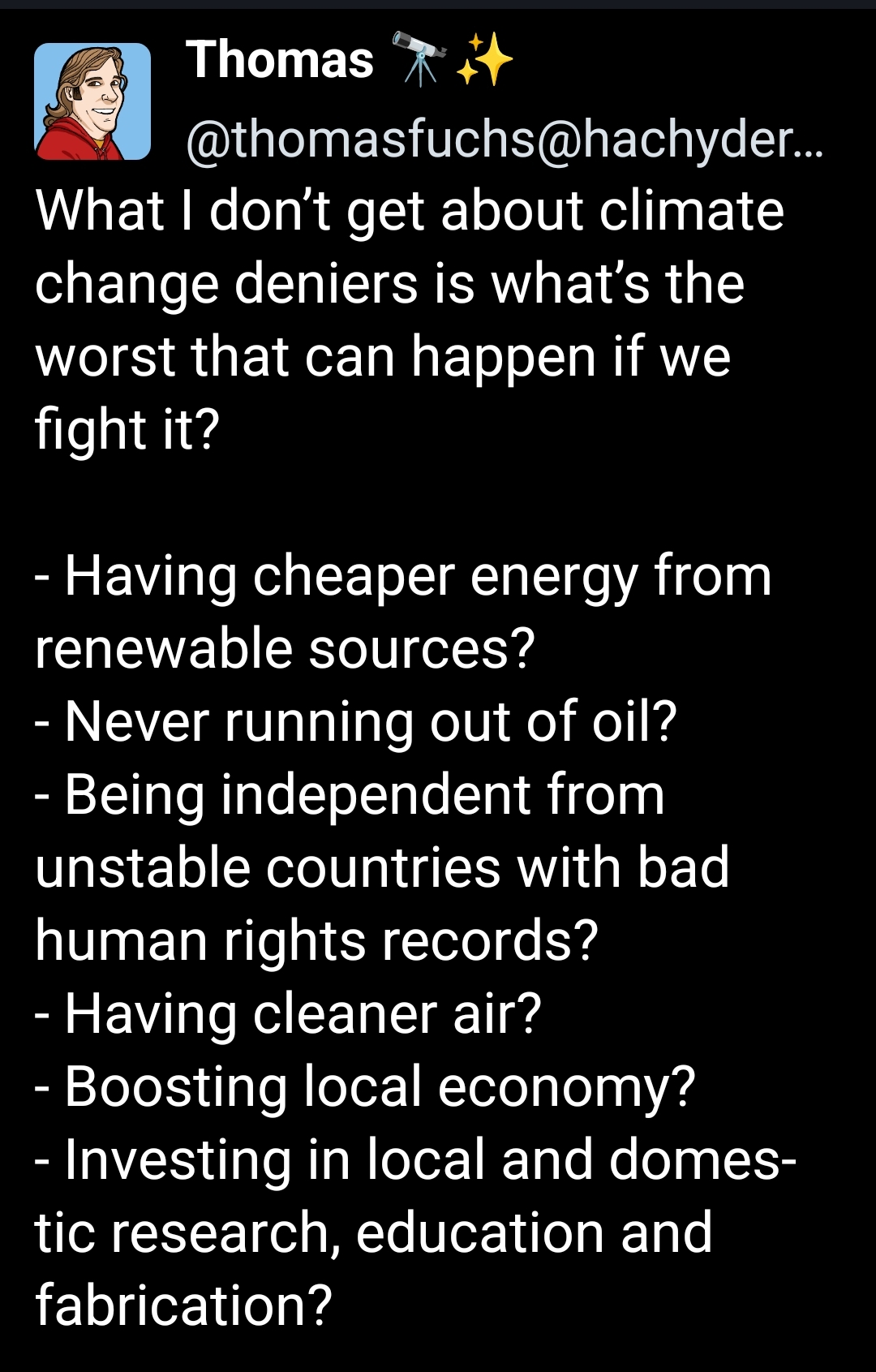this post was submitted on 18 Aug 2024
1524 points (98.6% liked)
People Twitter
5449 readers
945 users here now
People tweeting stuff. We allow tweets from anyone.
RULES:
- Mark NSFW content.
- No doxxing people.
- Must be a pic of the tweet or similar. No direct links to the tweet.
- No bullying or international politcs
- Be excellent to each other.
- Provide an archived link to the tweet (or similar) being shown if it's a major figure or a politician.
founded 2 years ago
MODERATORS
you are viewing a single comment's thread
view the rest of the comments
view the rest of the comments

This is such a straw-man argument. I'm highly in favor of renewables, but I'm not blind to what other people think.
Say you're someone who legitimately doesn't believe that climate change is happening, or at least that if it's happening it's not being caused by humanity. (People who believe those things are definitely out there.) In that case, what's the worst thing that can happen?
Obviously this isn't something that people who think climate change is a hoax are concerned about. They're worried that renewable sources will be more expensive and less reliable.
People who don't believe in climate change also don't think we're anywhere close to running out of oil. In fact, they think it's the same people pushing the "climate change hoax" that are pushing the idea that the planet is running low on oil. "Peak oil" has been predicted for decades, and they just keep finding more and more oil.
The US is the #1 global oil producer. Canada is 4th on the list. Brazil is 8th. Mexico is 11th. Norway is 13th. With Natural Gas it's similar, US is #1, Canada is #4, Australia is #7, Norway is #9. Aside from the obvious jokes about the US being an unstable country with a bad human rights record, this concern is overblown. If OPEC limits production the prices will go up, but that means more profit will flow to the US. Assuming this is meant for a US audience, that's obviously a good thing for their economy. If it's meant for say the UK, there's going to be more dependence on fossil fuels from Russia, but it isn't like all fossil fuels come from enemies of the UK.
https://en.wikipedia.org/wiki/List_of_countries_by_oil_production
https://en.wikipedia.org/wiki/List_of_countries_by_natural_gas_production
A lot of the people who are pro-fossil fuels are older. They've seen the air quality go up consistently over their lives. They don't think of the current world as a hellscape with dirty air, they see it as the cleanest air they've ever had. The problem is that the pollutant that most people are worried about now is invisible and... unsmellable? Unlike the soot and smog that makes pollution so obvious.
The US is the country that produces the most oil and the most natural gas, it also makes the most gasoline / petrol by far. Domestic research, education and fabrication is a US thing when it comes to oil and gasoline. By contrast, most solar panel components are produced in China. 96.8% of photovoltaic wafers are made in China. Wind Turbines are also largely made in China.
Sure, theoretically investment could mean that generation is shifted away from China and to manufacturers in the west. But, when was the last time the west ramped up manufacturing to compete with China in anything?
--
The reason that so many people are opposed to change are:
I'd like to add that a lot of these people work in the oil or coal industry or have family members who do. The work, as dangerous and comparatively ill paying as it may be, may be the only thing that puts their town on the map and keeps food on the table. Not seeing a way out for those who can't or won't be retained for another job can be pretty scary, a fear that is very much preyed a upon by conservatives.